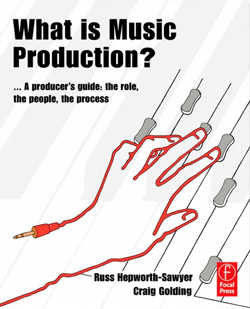
Tim Speight explains how he dealt with getting the take in terms of vocal tracking from a new or relatively new artist.
“If an artist hadn’t been involved in the songwriting process and a lot of the time within the manufactured stuff they might not be, what we would do at that point is get a session singer in as a guide.”
“Someone who I knew could nail the emotion, the phrasing, everything to do with that song to start with… that’s the first thing.”
“When the person comes in and you’re trying to get the real vocal take from the artist, this is where you’ve got to allocate quality time to take the pressure away from them.”
“We used to get a lot of artists who were relatively new and they’d be petrified coming into a pro studio with all the gear, et cetera. It’s sometimes got the potential to go wrong.”
“What we used to do when the time was available was get them in but tell them that ‘we’re not going to record today, we’re just going to have a mess about with the track’… and the relief on their face. We didn’t record them we just got them into the control room.”
“What you’re doing is setting the scene and getting them to relax and have a laugh with it. If you can just break down that barrier, get them to relax, and get away from that phobia of going into the studio.”
“As an engineer or producer you’re going into the same studio every day but for a vocalist it is different. I have a lot of respect for vocalists as they are projecting their own instrument; they don’t have anything to hide behind.”
Liquid Refreshment?
The folklore exists. Yes, the band is drinking a crate of lager throughout the late going session, believing that the album is sounding better and better.
They might escalate the alcohol levels, or indeed go through to something altogether different. It happens less these days, but we’d be naïve to say that it does not happen.
Prepare yourself. You have some choices. You can either indulge in some or all of what’s on offer (providing you can handle yourself). There are those that have suggested that it is imperative to be in the same “space” or “zone” as your musicians; to hear what they hear and to share the same responses. This is your choice.
You can take the view, of course, that you’re above any form of indulgence and therefore in control of the session and the mother ship!
In this state of mind, you’re more likely to be able to objectively know when to accidentally-onpurpose undo that last Pro Tools take, as the performance drops. Conversely, you might find the artists inspired beyond their normal levels and instruct the engineer to simply keep the tape rolling.
Recording the Recording
It is a common opinion among music production students that, as musicians, engineers, and producers now use DAWs such as Pro Tools and Logic, the need to take notes in a session, use track sheets, or make production logs is obsolete.
In some ways we can see the argument for this, as DAW software has the ability to store and recall so much information. However, what is being forgotten here is the need to have an organized approach to what you are doing without having to rely purely on the instant recall of a Pro Tools or Logic session.
What was recorded on which track? Which take was best? Which mic did we use and where did we put it? What reverb was applied? These are all details that could be noted down on a track sheet during a session.
The ability to recall this information without having to be at the computer running the DAW software session could be really useful at some point in the production process, especially if you’re discussing the session and its detail outside of the studio, for example.
We are not suggesting that every professional engineer and producer make a huge amount of written notes in every session, but more that they will not just rely on the recording software to record and catalog every choice and decision that is made.
How and to what extent you decide to do this is a personal choice. It’s as much about developing the right mindset and approach to a session as it is about making a note of all the details.
This is the fourth and final segment in our series by Golding and Hepworth-Sawyer on audio production. Additional segments are available here.
To purchase What is Music Production? click on over to the Focal Press website.
Russ Hepworth-Sawyer is a sound engineer and producer with many years’ experience of all things audio and is a member of the Association of Professional Recording Services and the Audio Engineering Society; a Fellow of the Institute For Learning (U.K.); and a Director of the Music Producer’s Guild. Craig Golding is currently Course Leader for the Music Production degree program at Leeds College of Music in the U.K. and also has an active freelance career in sound engineering and production with over a decade’s experience working in the industry.
